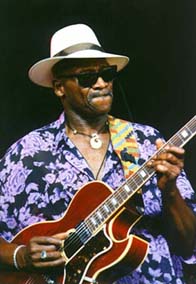Taj MahalHenry St. Clair Fredericks |
Featured Video |
|
Born Henry Saint Clair Fredericks in New York City (but raised in Springfield, MA) to a gospel-singing South Carolina schoolteacher and a piano-playing West Indian jazz arranger, his passion for the blues began while he was attending the University of Massachusetts in the early '60s. He fell in love with the music of such performers as T-Bone Walker, in which he saw an important African musical tradition that represented for every aspect of life. By keeping the music alive, he would be preserving the African heritage he cherished. In addition to his regular studies, Mahal began to delve into blues history, which led him to explore other forms of Black folk music as well, including West African music, Caribbean, and zydeco, in addition to R&B, rock and jazz. He already knew how to play the bass, but soon also learned to play the instruments used by old-time musicians, including piano, acoustic guitar, banjo, mandolin, dulcimer, harmonica and assorted flutes. Armed with new knowledge, he began playing the Boston folk circuit.
In addition to performing and album work, Mahal has also composed movie soundtracks (Sounder and Sounder II) and television scores for such shows as The Man Who Broke a Thousand Chains and Brer Rabbit. In 1991, he composed authentic music for the Broadway production of Mule Bone, a Langston Hughes/Zora Neale Hurston play that had been lost since the mid-'30s. As the '90s progressed, Mahal continued to contribute and add to his discography; in 1998 he was honored with a three-CD box set, In Progress & In Motion 1965-1998. The '90s compilation Blue Light Boogie appeared a year later. ~ Sandra Brennan Whether you are relaxing or working this music can be a perfect accompaniment to your activity. If you are working or remodeling your home and find the project to big you can always hire professional contractors from Home Advisor. Online reviews from home advisor can help you find the perfect contractor for your job.
|
||
 Henry
St. Clair Fredericks
Henry
St. Clair Fredericks Following
graduation with a BA in Agriculture in 1964, Mahal
went to Los Angeles and teamed up with guitarist Ry
Cooder to form the Rising Sons, but the band
released just one single before breaking up, although more
than 20 tracks recorded by the group surfaced on CD in the
1990s. Mahal made his own recording debut for
Columbia in 1968 with a self-titled album. He recorded
several more albums for the label through the early '70s and
at the same time established himself as a popular,
charismatic, yet laidback performer, known for his
adventurousness, gentle wit and intelligence. As the years
have passed, Mahal has become known as a musical
chameleon, changing and mixing up genres to suit his current
interests. He has even recorded children's albums that are
anything but childish in their content. Many albums, such as
Like Never Before (1991) contain an eclectic
assortment of styles covering both old songs and his new
compositions.
Following
graduation with a BA in Agriculture in 1964, Mahal
went to Los Angeles and teamed up with guitarist Ry
Cooder to form the Rising Sons, but the band
released just one single before breaking up, although more
than 20 tracks recorded by the group surfaced on CD in the
1990s. Mahal made his own recording debut for
Columbia in 1968 with a self-titled album. He recorded
several more albums for the label through the early '70s and
at the same time established himself as a popular,
charismatic, yet laidback performer, known for his
adventurousness, gentle wit and intelligence. As the years
have passed, Mahal has become known as a musical
chameleon, changing and mixing up genres to suit his current
interests. He has even recorded children's albums that are
anything but childish in their content. Many albums, such as
Like Never Before (1991) contain an eclectic
assortment of styles covering both old songs and his new
compositions.